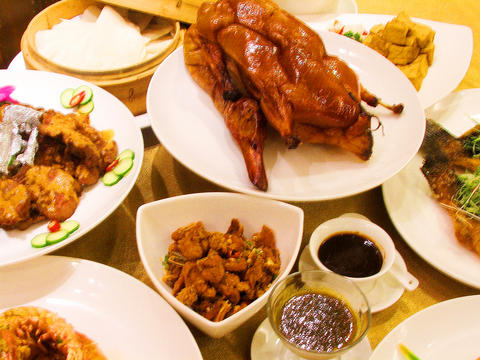The newly minted Holiday Inn East Taipei is engaged in a media blitz to generate publicity, and customers looking for hotel-quality menus at reduced prices are the beneficiaries.
Located just off the Northern Taiwan Second Freeway (北二高) in Shenkeng, Taipei County, roughly 10 minutes by car in non-rush hour traffic from Taipei 101, the hotel has brought in a general manager from Shanghai, a public relations director from Hong Kong, and hired an executive chef, also a Hong Kong native, from Taipei's Westin hotel. Its Western-style restaurant, Sam's Cafe, has been up and running for more than two months, and, on Wednesday, Executive Chef Paul Ng (伍見朋) was in the kitchen as the hotel unveiled Canton, its new Cantonese restaurant, in a preview lunch for journalists and travel agents.
Among the dishes served were Cantonese-style roast duck (廣東燒鴨, NT$900), pan-fried lamb chops with fermented bean curd (乳香焗羊扒, NT$450) and Ng's own special creation, sauteed shrimp balls with XO sauce (XO醬蝦球, NT$380). The second and third dishes are featured in Canton's NT$8,000 table d'hote menu, a 12-course meal for 10 people that comes with juice and two bottles of red wine. Among the other courses are braised shark's fin soup with mixed vegetables (紅燒三絲翅), steamed grouper with soy sauce (清蒸石斑魚) and stewed chicken with ginseng soup (鮮人蔘燉雞). A similar menu with a few slightly pricier variations costs NT$10,800.

PHOTO: COURTESY OF HOLIDAY INN
For the most part, the dozen or so courses sampled passed muster, provided one has a taste for Cantonese cuisine. Of these, the lamb and the sauteed shrimp balls with XO sauce, Ng's spicy take on a traditional dish, were the most memorable. My favorite dish was the Cantonese roast duck, but it is not on either of the set menus. Unlike Peking duck, the bird for the Cantonese variant is completely sealed and hung on a hook to lock in the flavor, leaving the meat a tad less dry or more oily, depending on your point of view.
Canton's decor includes a mirrored wall covered with white calligraphy and a reproduction of a Tang-dynasty painting from the National Palace museum. The dominant colors are gold, red and black; but the shades are muted and the overall effect is not overbearing. There are four private dining rooms, each named after a season; the smallest is available for an NT$4,000 minimum charge.
As with Sam's Cafe, the judgment here is that Canton distinguishes itself from the competition with its relatively low prices and is recommended if you have a car, perhaps as part of a trip to Taipei City Zoo or Shenkeng's Old Street. (The hotel operates a free shuttle bus service for room guests. For others, the nearest MRT station is an NT$200 cab ride away.) The set menus are good primers for people who are unfamiliar with Cantonese food, and the private rooms are suitable for small- to medium-sized banquets.
Until Oct. 20, Canton has "come three get one free" promotion during lunch hours for customers who bring their business cards.

June 2 to June 8 Taiwan’s woodcutters believe that if they see even one speck of red in their cooked rice, no matter how small, an accident is going to happen. Peng Chin-tian (彭錦田) swears that this has proven to be true at every stop during his decades-long career in the logging industry. Along with mining, timber harvesting was once considered the most dangerous profession in Taiwan. Not only were mishaps common during all stages of processing, it was difficult to transport the injured to get medical treatment. Many died during the arduous journey. Peng recounts some of his accidents in

“Why does Taiwan identity decline?”a group of researchers lead by University of Nevada political scientist Austin Wang (王宏恩) asked in a recent paper. After all, it is not difficult to explain the rise in Taiwanese identity after the early 1990s. But no model predicted its decline during the 2016-2018 period, they say. After testing various alternative explanations, Wang et al argue that the fall-off in Taiwanese identity during that period is related to voter hedging based on the performance of the Democratic Progressive Party (DPP). Since the DPP is perceived as the guardian of Taiwan identity, when it performs well,

The Taiwan People’s Party (TPP) on May 18 held a rally in Taichung to mark the anniversary of President William Lai’s (賴清德) inauguration on May 20. The title of the rally could be loosely translated to “May 18 recall fraudulent goods” (518退貨ㄌㄨㄚˋ!). Unlike in English, where the terms are the same, “recall” (退貨) in this context refers to product recalls due to damaged, defective or fraudulent merchandise, not the political recalls (罷免) currently dominating the headlines. I attended the rally to determine if the impression was correct that the TPP under party Chairman Huang Kuo-Chang (黃國昌) had little of a

At Computex 2025, Nvidia CEO Jensen Huang (黃仁勳) urged the government to subsidize AI. “All schools in Taiwan must integrate AI into their curricula,” he declared. A few months earlier, he said, “If I were a student today, I’d immediately start using tools like ChatGPT, Gemini Pro and Grok to learn, write and accelerate my thinking.” Huang sees the AI-bullet train leaving the station. And as one of its drivers, he’s worried about youth not getting on board — bad for their careers, and bad for his workforce. As a semiconductor supply-chain powerhouse and AI hub wannabe, Taiwan is seeing